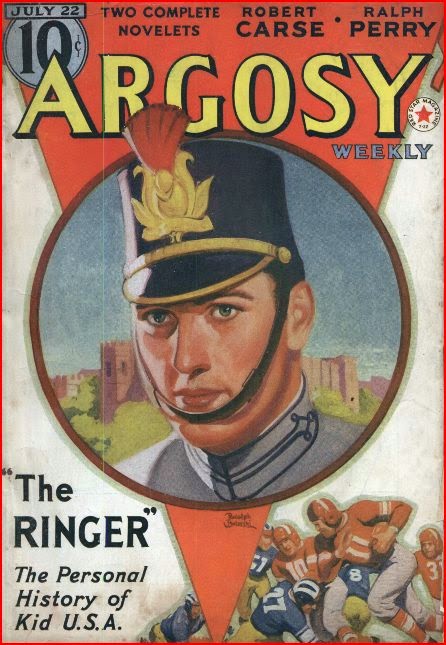
The real highlight of this issue is Ralph R. Perry's "Shark Master." Perry wrote raw pulp: packed with action, blood, thunder and rage. He worked in many genres and settings but seemed at his best in the South Seas and with tough seamen like his series character Bellow Bill Williams. In this story a man comes to a mysterious island to dive for pearls and avenge his brother, also a pearl diver, who was reported killed by sharks while attempting to harvest the treasures on the ocean floor. Our hero suspects that his brother was murdered, like several eminent pearl divers before him, by the trader who rules the island, its people, and the sharks offshore. The trader claims mastery over sharks: they swim and strike where and when he commands. That gives him extra power over the inevitably superstitious natives. "When they see me make the sharks obey, these blacks obey me like Hitler," the villain boasts in the story's nearest approach to contemporary relevance. This gives our hero two big mysteries to solve: how can the trader control sharks, and how might he have killed the hero's brother, whose specialized shark cage should have protected him from the sea predators? The revenge plot sets up several intense confrontations, most notably an early showdown as the drunken men exhume the brother's corpse in the middle of the night. There's a fury to Perry's writing and an inventiveness to the gimmickry with which he resolves the mysteries. It's great to see Argosy publishing old-school pulp like this at a time when it so often seems to chase vainly after prestige and relevance.
Robert Carse's second novelet in as many weeks is "Volcano," set during the last days before the famous eruption of Mt. Pelee. Like in last week's "Maximilian's Men," Carse imposes a romantic triangle on his period adventure. A ship's mate and his escaped prisoner, an engineer with Jor-El-like foreknowledge of the imminent disaster, become rivals for the affections of an aristocratic lady. Inevitably one will renounce love and life in favor of the other. Like last week's story it's entertaining enough but leaves a feeling that Carse is trying to force his pulp muse into a shape more appealing to Hollywood or the slicks with the romance angle.
The other stand-alones this week include William Edward Hayes's exciting "Comet on Wheels," in which one man struggles to prevent an out-of-control fuel car from colliding with a crowded passenger train; D. L. Champion's "Kiss the Gloves Goodbye," a curt, grim boxing story in which an old fighter's inspiring comeback proves less than met the eye; and Arthur Lawson's "Epitaph in Red," an Argosy Oddity in which an old-west codger reveals the secret behind his bushy beard and a secret about a young man's grandfather. This issue wraps up the reprint of A. Merritt's Seven Footprints to Satan and continues W. C. Tuttle's Thirty Days for Henry. The former is a classic of its kind, I suppose, and the latter is what it is, if you like that sort of thing.
Next week starts a serial by Theodore Roscoe, brings back once more Bretwalda the magic axe, and introduces us to western author C. K. Shaw, whose name carries a secret!
TO BE CONTINUED
No comments:
Post a Comment